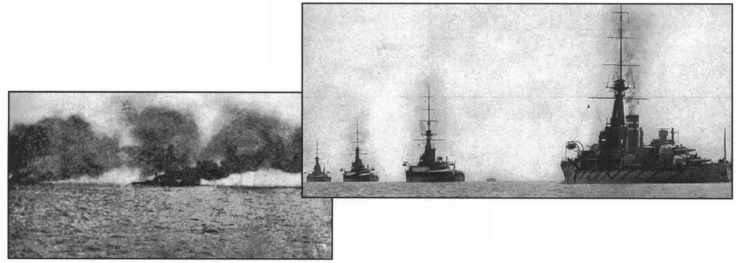
Britain went to war with a tiny army and a huge navy. The army grew and fought numerous battles. The navy fought only one major engagement, on May 31st, 1916, as the army was preparing for the Somme.
For almost two years, the British Grand Fleet had controlled the seas, blockading German ports and forcing Germany’s smaller High Seas Fleet to stay in port. But the Germans had a plan. They would send out their battlecruisers to lure a small number of British ships to their main fleet of battleships. Unfortunately for them, the British had broken the German navy code and knew of the trap.
In the middle of the afternoon, the British battlecruisers met the Germans at Jutland off the coast of Denmark, and a running battle began. The British suffered losses and, as the commander watched his ships explode, he commented, “There seems to be something wrong with our...ships today.”

The HMS Lion on fire
Ships of the British fleet at Jutland
By evening, the battleships were engaged, but darkness forced an end to the battle. The Germans ran for home and made it back to port safely. Neither fleet was destroyed. The British lost more ships, fourteen to the German eleven, but the German fleet never left port again.

The Invincible sinks to the bottom.
The British had a lot more to lose in the battle than the Germans. If the German High Seas Fleet had been destroyed, the war would have gone on as before. If the British Grand Fleet had been sunk, the blockade of Germany would have been broken, and the Germans could have shelled British ports and stopped their soldiers being sent over to France. The British Admiral Sir John Jellicoe was so important to the war effort that he was called by future prime minister Winston Churchill, “the only man who could have lost the war in an afternoon”.